DRAFT! Work in progress! Feedback welcome
One advantage startups have over established companies is that there are no discrimination laws about starting businesses. For example, I would be reluctant to start a startup with a woman who had small children, or was likely to have them soon. But you’re not allowed to ask prospective employees if they plan to have kids soon. Whereas when you’re starting a company, you can discriminate on any basis you want about who you start it with.
— Y Combinator founder Paul Graham, in How to Start a Startup
Christopher Steiner’s The Disruptor in the Valley in Forbes discusses how this essay, along with Paul’s Harvard talk, eventually inspired red-hot technology incubator YC. He doesn’t include this quote, alas, and also doesn’t mention the reports in the Mercury News and Wall Street Journal of YCs #diversityfail or Tereza Nemessanyi’s XX Combinator. I guess they didn’t fit in with the article’s subtitle: “Paul Graham’s Y Combinator has stormed Silicon Valley and pioneered a better way to build a company.”
YC has indeed had a huge impact.  Christopher reports that YC typically puts about $15-$20K into the companies in return for a 5% equity stake; with over 400 companies in their portfolio they’re a powerful force in the tech startup world. With the help of a lot of gushing coverage in the TechCrunch and their buddies in the tech press, 30 of their of the 36 startups in the most recent crop incubator have gotten funding since Demo Day in August, many of them over $1 million.  Collusion is soooo hot these days so it’s as good a time for a fluff piece as any.
Paul’s The New Funding Landscape predicts that the cozy win/win/win dynamics will continue for a while:
The super-angels will try to undermine the VCs by acting faster, and the VCs will try to undermine the super-angels by driving up valuations. Which for founders will result in the perfect combination: funding rounds that close fast, with high valuations.
It’s such a perfect combination for the overhelmingly white male worlds of tech founders, incubators like YC and TechStars, angel and “super-angel” investors (many of them ex-entrepreneurs), VCs, and the tech press that covers it all that recently people have started to question whether it’s a bubble. Paul thinks not, and the word doesn’t come up in Christopher’s article.
There’s plenty of good stuff though. Jessica Mah, co-founder and CEO of inDinero and several other YC entrepeneurs have some good perspectives.* There’s also a nice description of how the YC mafia protect and collaborate with each other and “regard Graham as their sensei”. Greg from YC investor Sequoia Capital, TechCrunch’s Michael, and AngelGate bad and good guys “foul-mouth Dave” and Ron (who’s invested in 20 YC companies and helped Michael sell out to AOL ) all illustrate this nicely in the article, sharing different ways YC is great. The early reviews on Hacker News, one of the hubs of the community, laud the article as a great portrait of Paul and praise him for “giving back to the community in such a sustainable, profitable way.”

The Big Interview describes a key part of the YC selection process: the hot 10-minute session founders go through with all five partners bearing down and asking questions at the same time. And no proprietries! What does Paul look for?
It really paints a picture of the so many meetings in the high-tech world: a multi-way competition showing off whose smartest and most powerful and who’s got the balls, people with the power ganging up on somebody looking for help, sadism masked with “it’s for your own good.” If YC really feels so terrible about seeing founders’ hands shaking during the interview, why not create a less hostile environment?
Paul contributes a side-bar, the all-male What it takes (also posted as What We Look for in Founders). It’s a very interesting ad, making it clear to founders and investors what YC is selecting and training for. The ideal YC founders are cockroach-like in their determination,** ready to give up on their dreams, intelligent, and naughty. They care about “big moral questions”, but aren’t into “observing proprietries.” They delight in breaking rules, although of course not “rules that matter” to Paul.
Unfortunately there isn’t any discussion the implications of these criteria. For example, the YC universe now has hundreds of companies trained in an overwhelmingly-male environment that legitimizes discrimination against women. Maybe for them this isn’t a big moral question and all stuff about equality is just rules that don’t matter, but others disagree.  What impact does this have on the tech scene as a whole? As women in technology continue to improve their skills in highlighting discrimination, and other incubators emerge, what are the likely implications for YC?
 And speaking of pink elephants, there’s a huge collective blindspot here. YC’s companies, selected on the basis of criteria that favor young guys and with the mindset that discrimination against women is a competitive advantage, get great training in what it takes to build a product and a business. Then they’re covered by the overwhelmingly-male tech and business press, funded by the overwhelmingly male super-angel and VC worlds, and acquired by companies run and owned mostly by guys those same angels and VCs have invested in. Lucky founders then share their wisdom with and invest in the next generation of startups. Repeat.
And speaking of pink elephants, there’s a huge collective blindspot here. YC’s companies, selected on the basis of criteria that favor young guys and with the mindset that discrimination against women is a competitive advantage, get great training in what it takes to build a product and a business. Then they’re covered by the overwhelmingly-male tech and business press, funded by the overwhelmingly male super-angel and VC worlds, and acquired by companies run and owned mostly by guys those same angels and VCs have invested in. Lucky founders then share their wisdom with and invest in the next generation of startups. Repeat.
You don’t by any chance think they’re collectively missing most of the best opportunities?
As Cindy Gallop says, guys talking to guys about guys create a closed loop where what passes for innovative becomes increasingly less and less so. Paul’s comments about VCs in footnote 3 of “The New Funding Landscape” apply just as well to YC’s current success:
They could make it self-perpetuating if they used it to get all the best new startups. But I don’t think they’ll be able to. To get all the best startups, you have to do more than make them want you. You also have to want them; you have to recognize them when you see them, and that’s much harder.
Indeed. YC has gender bias and other forms of discrimination institutionalized so deeply in their culture and their selection criteria that it’ll be a very disruptive “pivot”. And probably very entertaining, too!
Update, Jan 2011: Dynamite conclusion still needed :-)Â See the comments for observations about Hacker News since the original draft.
* although as I discuss at somewhat greater length in a comment in Tissue turgor and Y Combinator’s secret sauce, it would have been great to hear from other women too. Most glaringly, Jessica Livingston is Y Combinator co-founder and married to him and she doesn’t even get a quote and a sidebar?  It also would have been nice to hear from Amanda Peay of Message Party, author of I’m a Female YC Founder and You Can Be Too.
** more on founders as cockroaches in Liz Gannes’ summary of the recent YC startup school on GigaOm. Congrats to GigaOm for closing another $2.5 million in funding in a very cluttered space . Â And while we’re at it, congrats to Liz who along with Ina Fried is joining All Things Digital.
Image credit: Pink Elephants by Rakka, via Flickr, licensed under Creative Commons




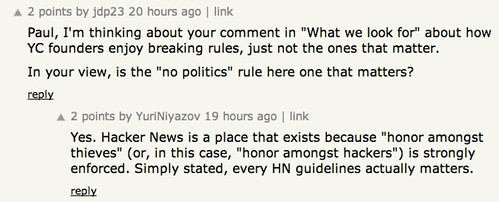
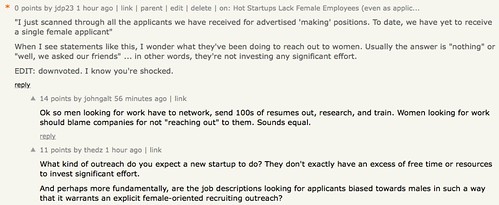

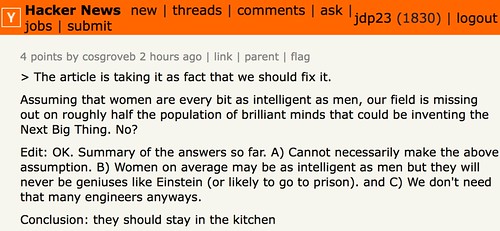
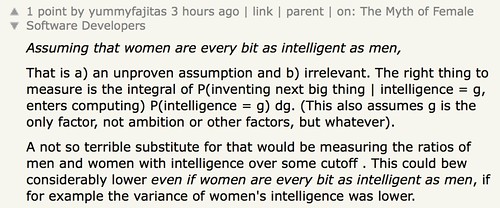
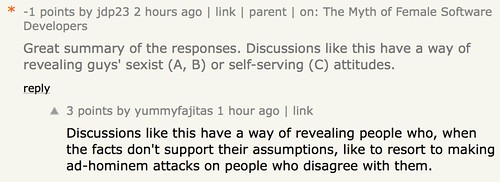



































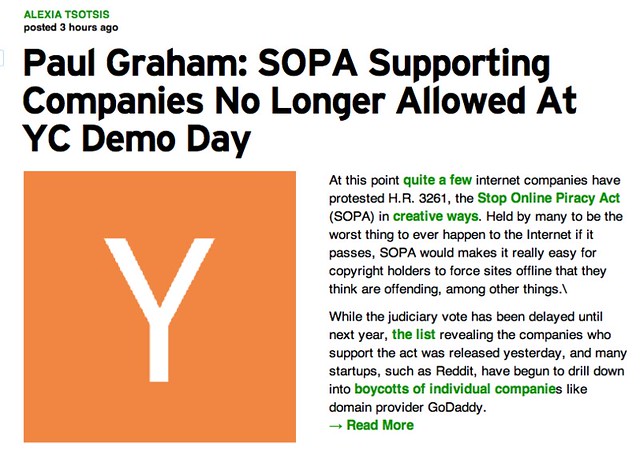
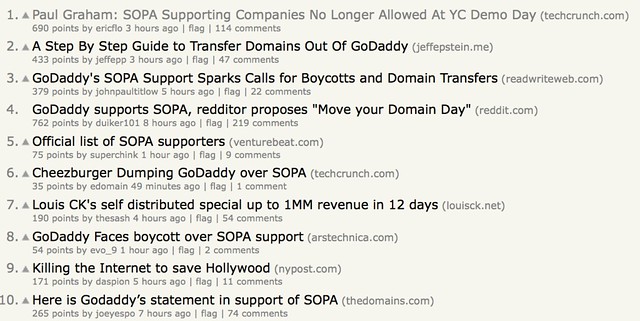








 The framing is somewhat strange in VentureBeat‘s debate
The framing is somewhat strange in VentureBeat‘s debate 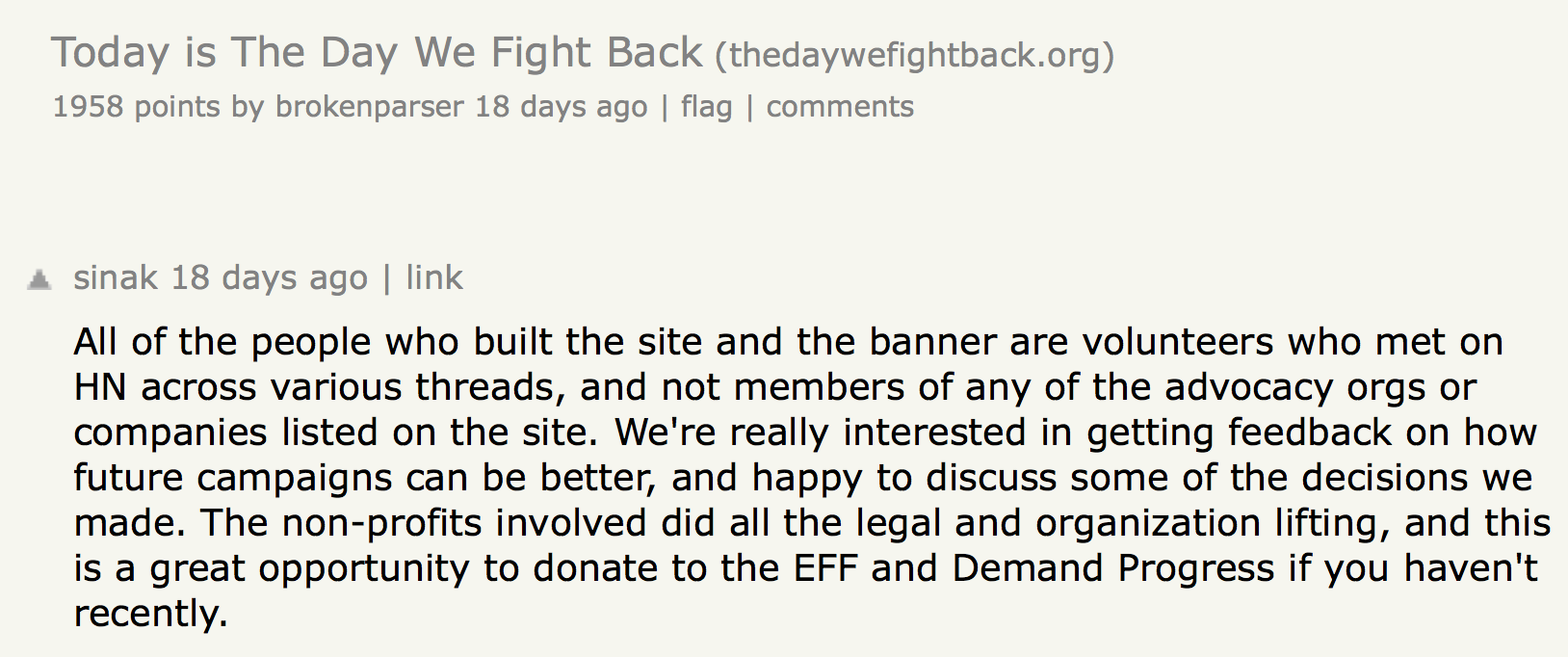
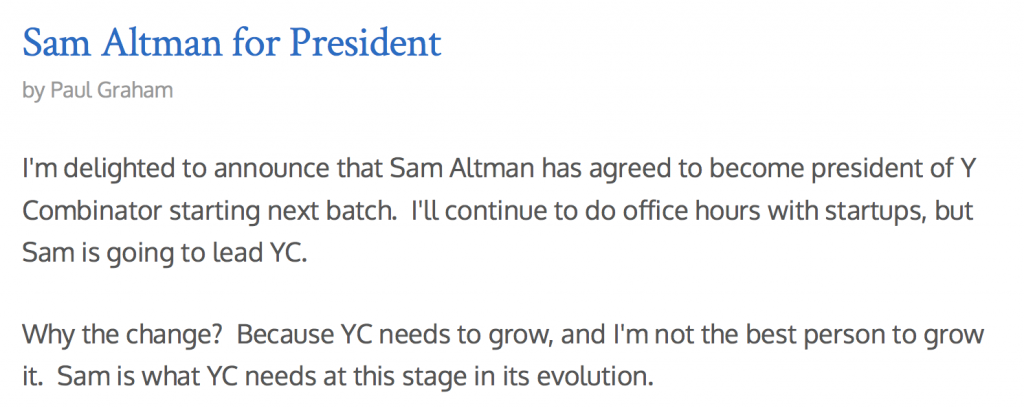




 Both of those graphs show up in Ellen Chisa’s
Both of those graphs show up in Ellen Chisa’s 
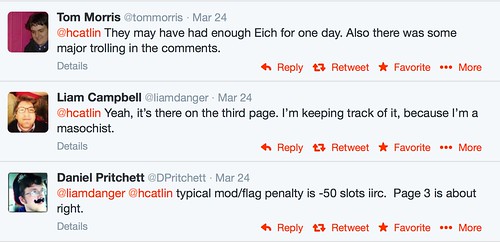



 Hmm, didn't see this one coming:
Hmm, didn't see this one coming: 

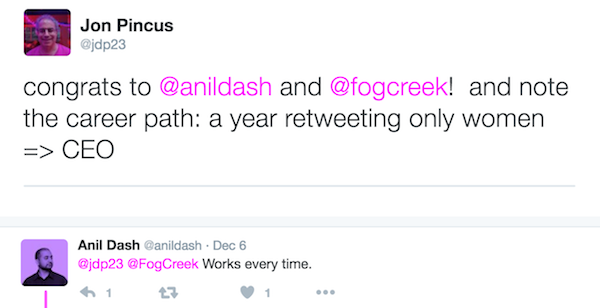
![[flagged] Mastodon Is Like Twitter Without Nazis, So Why Are We Not Using It? (vice.com)](https://tootcatapril2017.s3-us-west-2.amazonaws.com/media_attachments/files/000/009/938/original/2ce4d5dc914ec4a6.png?1492012763)
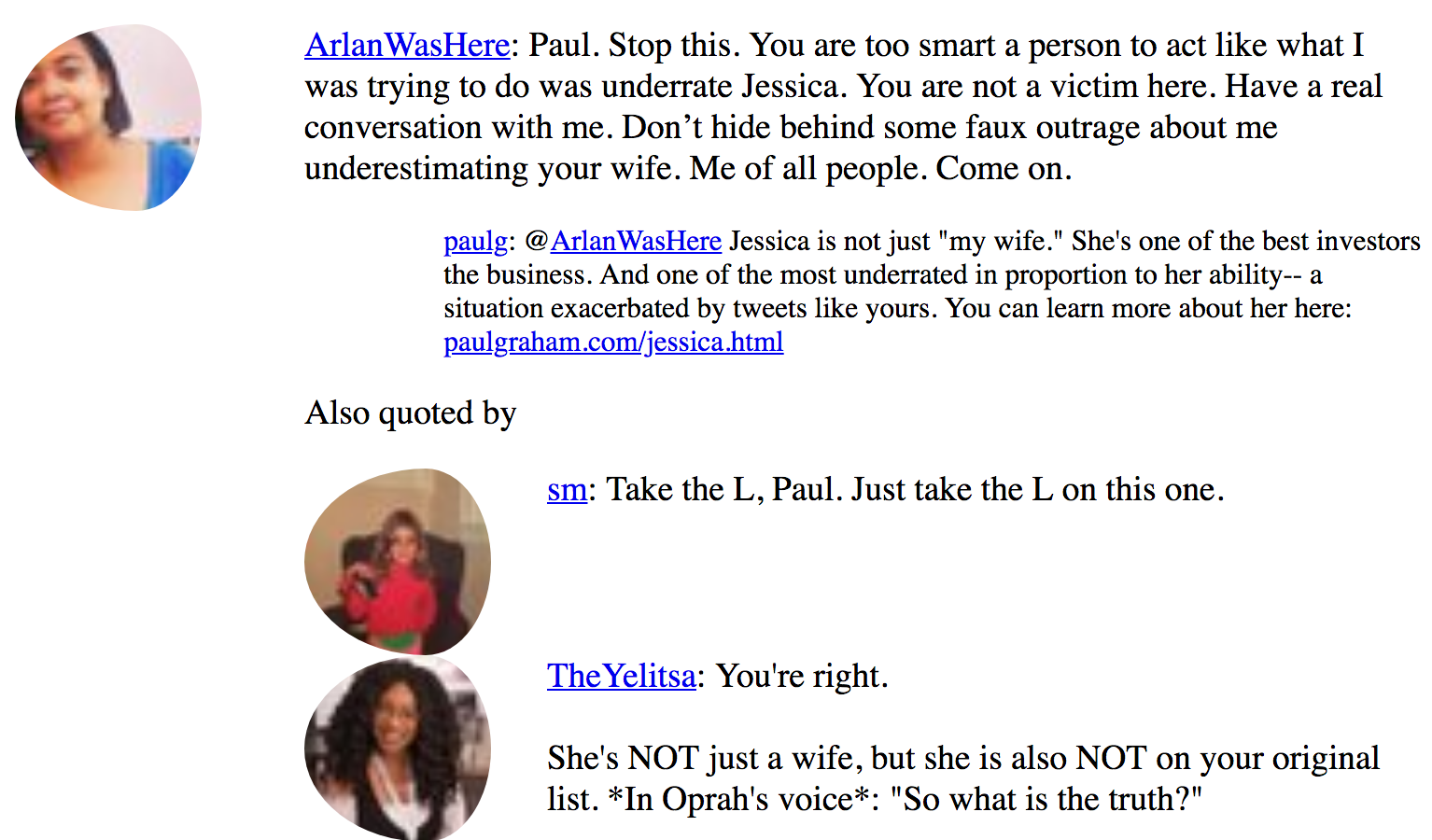
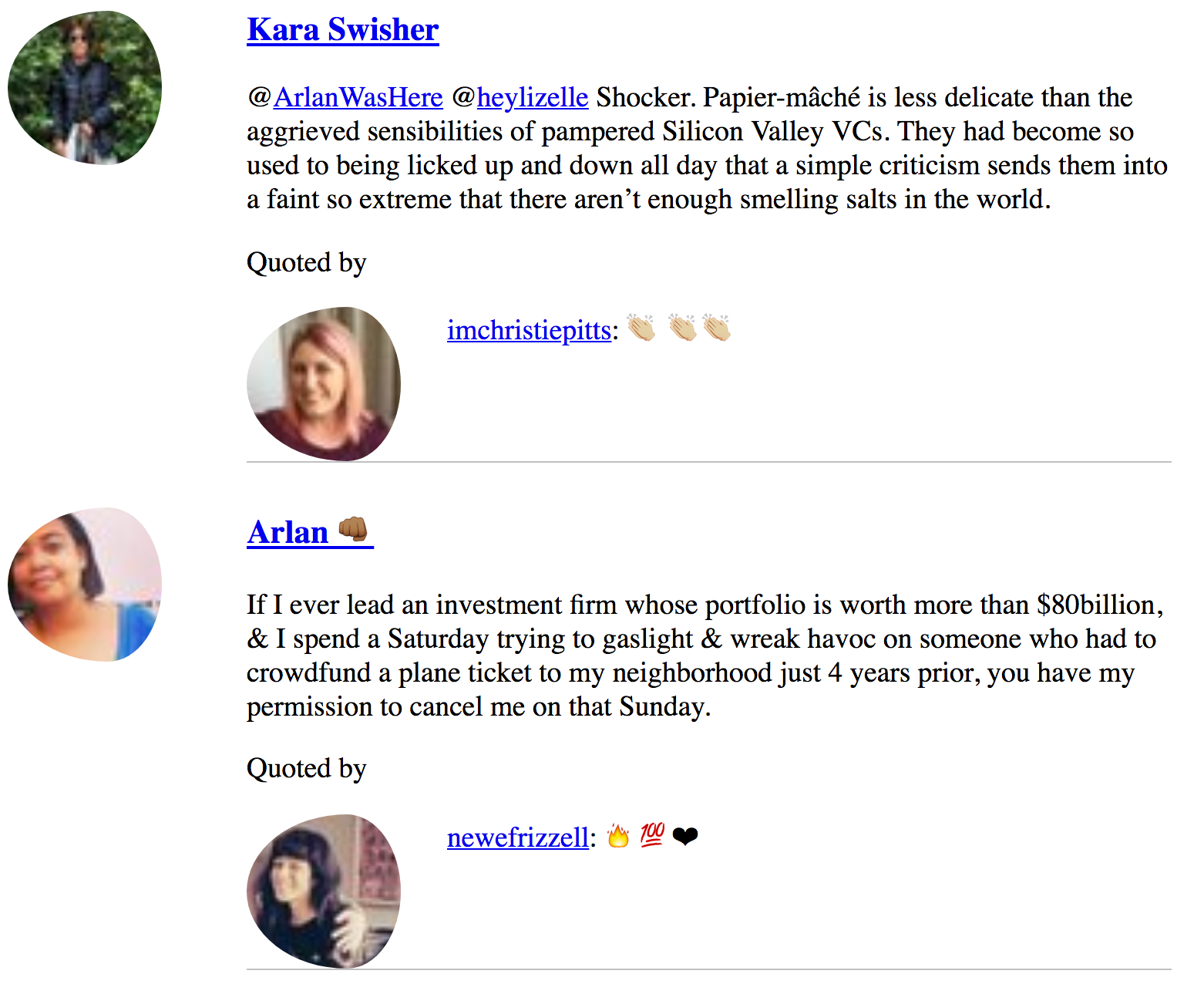
Leave a Reply